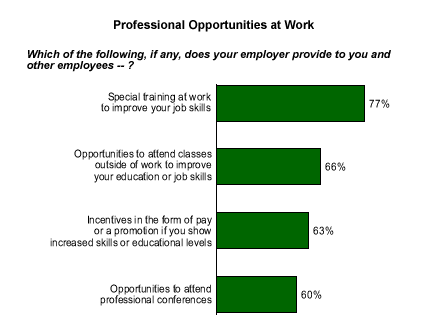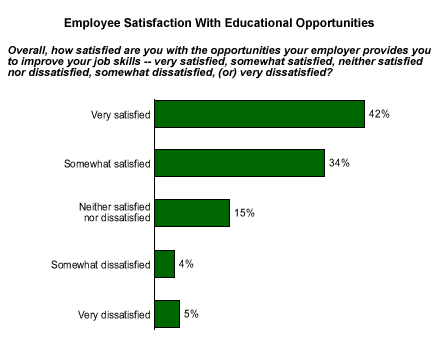Thirty percent of the employees working for private sector, for-profit companies say their companies experienced a hiring freeze at some point in 2002, according to the December 2002 Employee Outlook Index, a joint effort of UBS and The Gallup Organization*. More importantly, 25% say that they expect their companies to implement a hiring freeze in 2003. It's little wonder that so many people are talking about a "jobless recovery."
It's common knowledge that one reason we're experiencing a jobless recovery is that the economy is not growing fast enough to require corporate America to add new employees. What many Americans don't understand, however, is that increases in per-person productivity actually contribute to the problem by making it easier for many companies to delay additional hiring or even lay off employees. Faced with slowly growing markets, U.S. corporations are focusing on doing more with less -- increasing the productivity of individual employees -- as a way to raise profitability by reducing the size of their workforce without cutting into production.
When the economy does regain positive momentum, this increased productivity holds the promise of more rapid growth without inflation, combined with real profit increases. This will be terrific for corporate America and the equity markets and great news for employees of the nation's most highly competitive companies -- but only those employees who are able to increase their individual productivity and thus their value as human capital.
In this regard, one of the most pleasant surprises during the current economic soft spot has been the willingness of most private-sector companies to continue investing in their employees, along with the continued willingness of most employees to take advantage of the educational opportunities their employers offer. These companies and employees will benefit most as the economy expands in the years ahead.
Most Employers Offer Learning Opportunities
Nine in 10 employees (89%) working for private sector, for-profit companies say that in general their employer encourages them to improve their job skills. Even more significantly, three in four employees (75%) feel their jobs provide them with the opportunity to fully use their professional talents.
What kind of educational opportunities do employers offer their employees? Three in four employees (77%) say their employer offers special training at work that they can use to improve their job skills. Two-thirds (66%) say they have the opportunity to attend classes outside of work to improve their education or job skills. Almost as many (63%) say their employers provide incentives in the form of pay or promotions if they show increased skills or education. Six in 10 employees also say their employers provide them with opportunities to attend professional conferences.
How many employees take advantage of these educational opportunities? In 2002, more than half (54%) of employees who had an opportunity offered to them went to a professional meeting, attended a special training session, or took classes outside of work to learn material related to their professional development.

Most Employees Are Satisfied With Their Educational Opportunities
Three-fourths of employees (76%) also tell 优蜜传媒that they are "very" or "somewhat" satisfied with the opportunities their employers provide them to improve their job skills, and another 15% say they are "neither satisfied nor dissatisfied." Nine percent of employees are "somewhat" or "very" dissatisfied with their opportunities to improve themselves and their productivity.

Bottom Line
Given the generally poor business conditions of the past couple of years and the overall lack of traditional capital investment, it is encouraging that most companies continue to recognize the value of investing in their employees. When budgets get tight, it can be tempting for companies to reduce or eliminate the opportunities they offer employees to improve themselves.
Evidently, however, most companies recognize that the key to being highly competitive and profitable in difficult economic times is increased employee productivity. Such an increase can only be realized by garnering a more talented workforce and offering it ways to improve education and skills.
Of course, it is incumbent upon employees to take advantage of these improvement opportunities to the greatest extent possible. Increasing their own productivity is the key not only to employees' short-term job security, but also to their own long-term success and the success of their companies.
*Results are based on telephone interviews with 675 adults who are employed with non-governmental, for-profit companies having five or more employees, aged 18 and older, conducted Dec. 5-8, 2002, and Dec. 19-22, 2002. For results based on the total sample, one can say with 95% confidence that the maximum margin of sampling error is ±4%. In addition to sampling error, question wording and practical difficulties in conducting surveys can introduce error or bias into the findings of public opinion polls.
